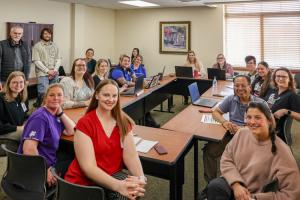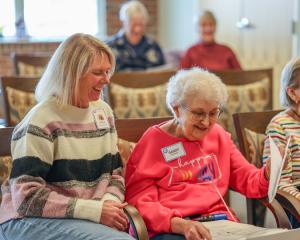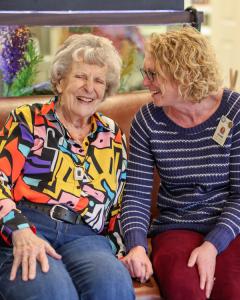FORT COLLINS, CO, UNITED STATES, April 10, 2025 /EINPresswire.com/ -- When a loved one faces a sudden health change, families are often thrown into a world of unfamiliar decisions. Questions like whether to choose rehab or skilled nursing, assisted living or home health, and what insurance will actually cover can quickly become overwhelming. For many in Northern Colorado, the answer starts with a trusted name in senior care: Columbine Health.
Columbine Health has earned a reputation not only for high-quality care but also for guiding families through every step of the transition process. With a network that includes long-term care, skilled nursing and rehab, assisted living, and independent living communities, their comprehensive approach is supported by a dedicated team of admissions professionals, discharge planners, social workers, administrators, and community liaisons who help make complex care paths easier to navigate.
The admissions team and discharge planners are often the first point of contact. They assess patient needs, coordinate with care teams, and determine the best level of care. Ellie Brunner, a discharge planner at Lemay Avenue, plays a critical role in ensuring smooth transitions. She gathers input from the clinical team and works directly with assisted living facilities, skilled nursing providers, home care services, and primary care providers to ensure residents are fully supported. Every case, she explains, is like its own puzzle, and partnerships are key to making the pieces fit.
When a resident prepares to move into a Columbine Health community, the admissions team, discharge planners, and community liaisons guide families through the details. From paperwork and physician orders to emotional support and preparation for move-in day, their role is hands-on and personal. Susie Brailsford, Director of Admissions and Social Services at Lakeview Commons Assisted Living, emphasizes that their team is often the first impression families get. Communication, compassion, and responsiveness are at the core of their approach. At Lakeview Commons, a resident-led Welcoming Committee helps new arrivals settle in, offering a sense of comfort and familiarity.
Community liaison Megan Parisi is often the first connection families make with Columbine. She focuses on creating a warm, welcoming experience and making sure families feel supported through every phase. On the independent living side, Anna Von Dreele, Administrator of The Windsor and Westwood Patio Homes, acknowledges that even independent residents face significant change. Downsizing, letting go of possessions, or the emotional weight of moving can all feel like a loss of independence. Her team walks with residents through this transition with empathy and respect, always working to preserve dignity and autonomy.
Once residents are part of the Columbine Health community, social workers step in as essential advocates. They help families understand insurance, assist with financial concerns, and ensure that each resident’s preferences and needs are heard. Kylie Thompson, Social Services Director at Lemay Avenue Health and Rehab, views her role as both an educator and a steady presence during uncertain times. She regularly supports residents through everything from financial hardship to the fear of losing independence. One example involved a resident who was anxious about going home due to challenges with groceries and meal prep. After one conversation and a referral to Meals on Wheels, his outlook completely changed.
Von Dreele notes that successful care always begins with listening—truly listening—to what matters to each resident. The goal is to empower people to maintain as much control as possible. Brunner echoes this sentiment, noting that many cases require creative problem-solving and adaptability. In one particularly complex situation, a resident facing repeated insurance denials paid privately for a short period. Brunner and her team connected her with Care Patrol to explore assisted living options. After a change in status, they were able to readmit her under skilled care. The success of that case, she says, came down to collaboration and persistence.
Communication is a core pillar of Columbine Health’s care model. Care conferences are typically held within the first two weeks of admission, giving residents and families the opportunity to ask questions, set goals, and align expectations. According to Brailsford, ongoing check-ins with families help ease stress and reinforce trust. Bonnie, whose mother transitioned to Lemay Avenue Health and Rehab, shared how impactful these regular updates were. She appreciated the clarity, transparency, and sense of not being alone in the journey.
While transitions in care can be emotional and challenging, they’re also full of moments that reveal the true heart of Columbine’s work. Thompson reflected on her experience supporting families through end-of-life care, saying that it’s often the most meaningful part of her role. When a family can simply be present with their loved one—without the burden of caregiving—she knows she’s made a difference.
Von Dreele shared a story that captures the full continuum of care Columbine offers. She worked with a couple who transitioned from The Worthington to New Mercer Commons, later received rehab at Columbine West and Centre Avenue, and eventually moved into memory care at Columbine West. Each transition was handled with care and communication, with staff across communities working together to keep the couple connected and supported.
For Brailsford, it's the messages from families that fuel her passion—comments like “I feel more at ease now that Mom is here,” or “A weight has been lifted off my shoulders” remind her why the work matters. Whether a loved one needs short-term rehab, assisted living, or long-term care, Columbine Health offers more than a place to stay. They offer a trusted partnership, advocacy, and peace of mind during life’s most vulnerable times.
Thompson says the emotional nature of the work is what makes it so meaningful. “It’s an honor to be there for people during one of the hardest moments in their lives.” Von Dreele advises families to do their research but stresses that nothing replaces visiting in person. “That’s how you get a feel for the people and the culture,” she says. Brunner agrees, noting that the more families educate themselves, the more empowered they’ll be to make the right decision.
Andrea Walker
Columbine Health Systems
+1 970-449-5541
email us here
Visit us on social media:
Facebook
LinkedIn
YouTube
Legal Disclaimer:
EIN Presswire provides this news content "as is" without warranty of any kind. We do not accept any responsibility or liability for the accuracy, content, images, videos, licenses, completeness, legality, or reliability of the information contained in this article. If you have any complaints or copyright issues related to this article, kindly contact the author above.




